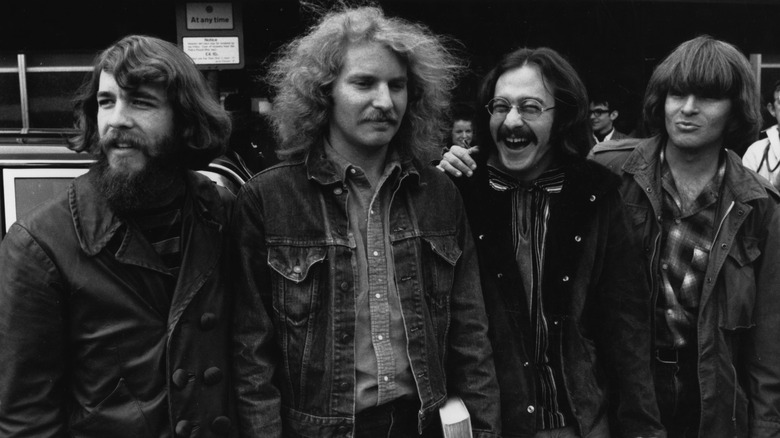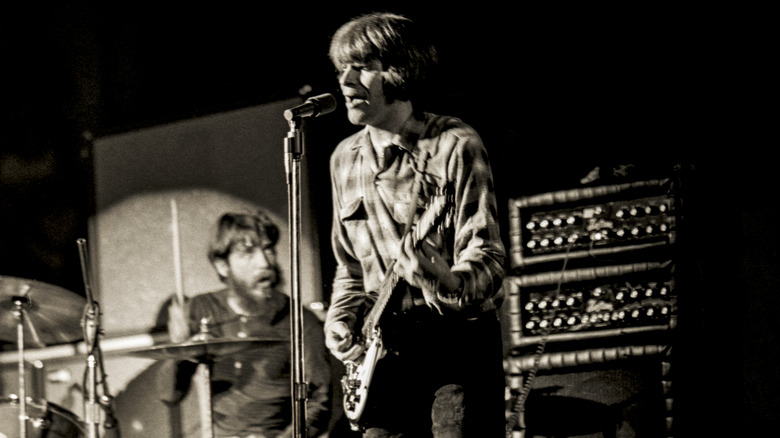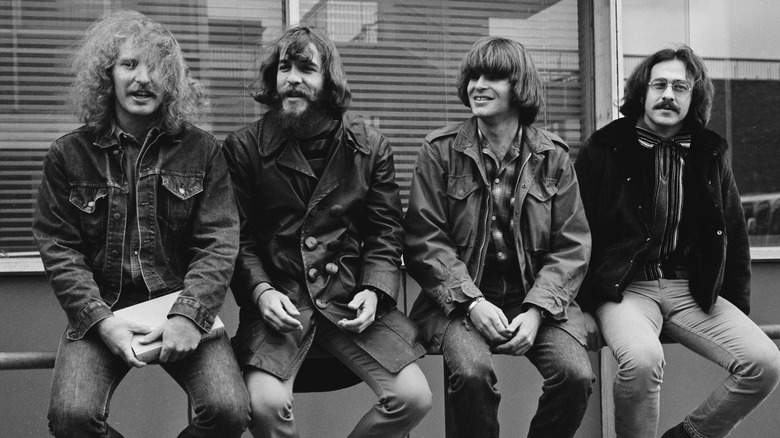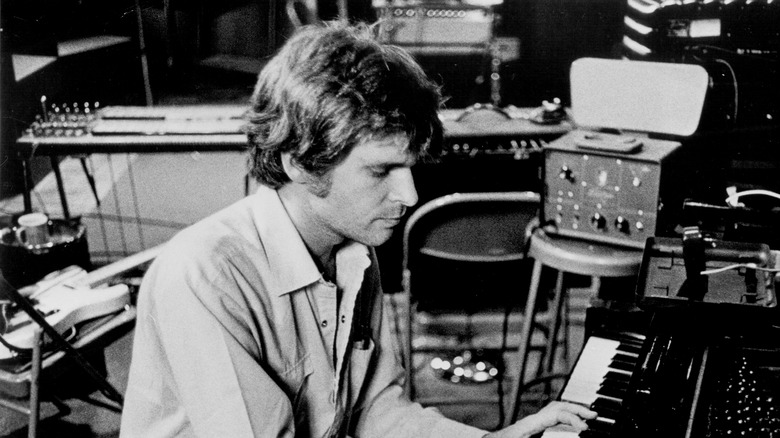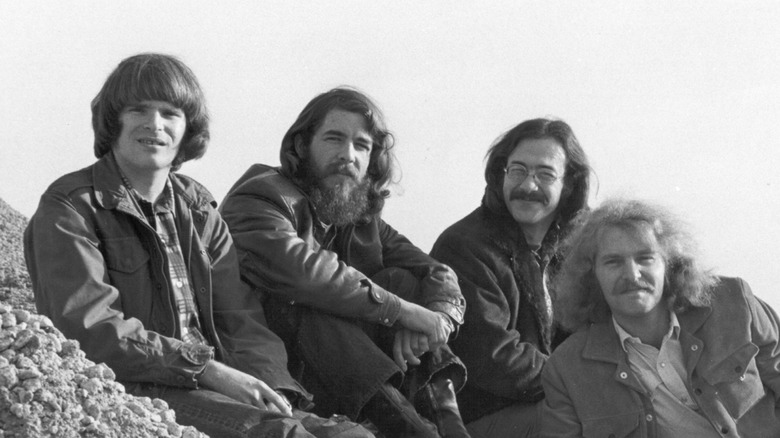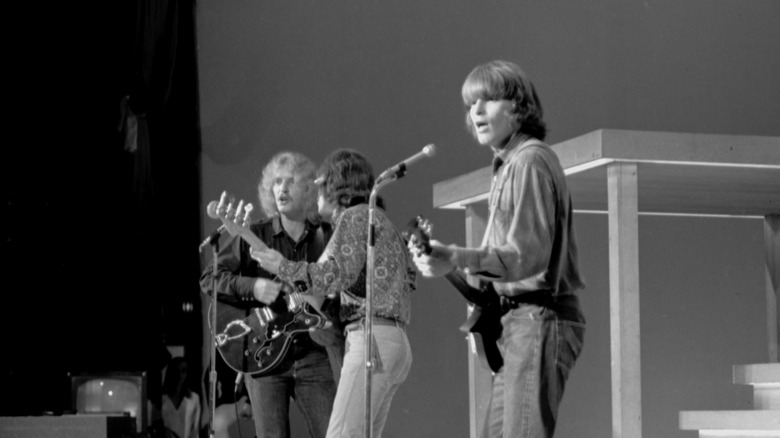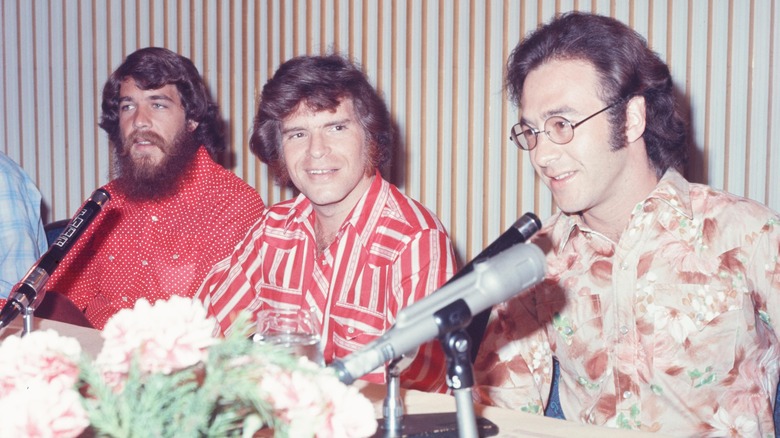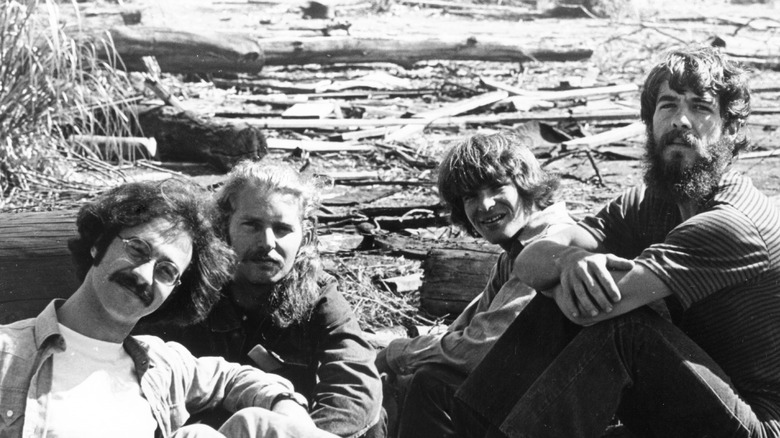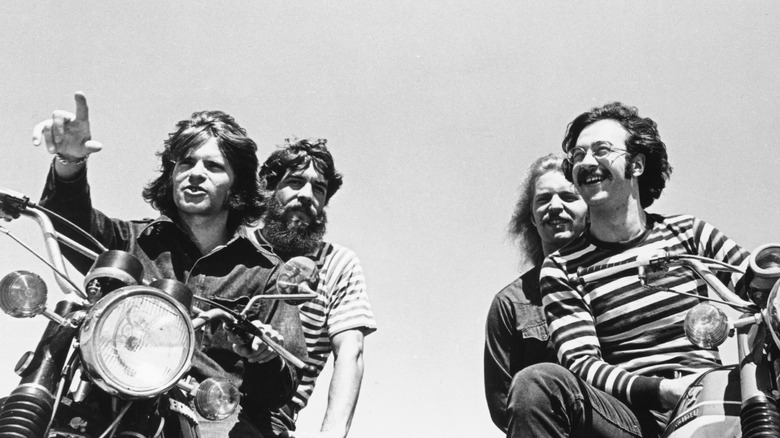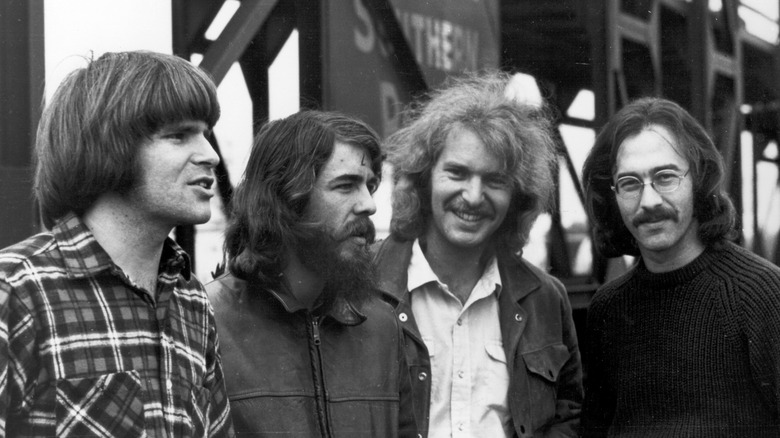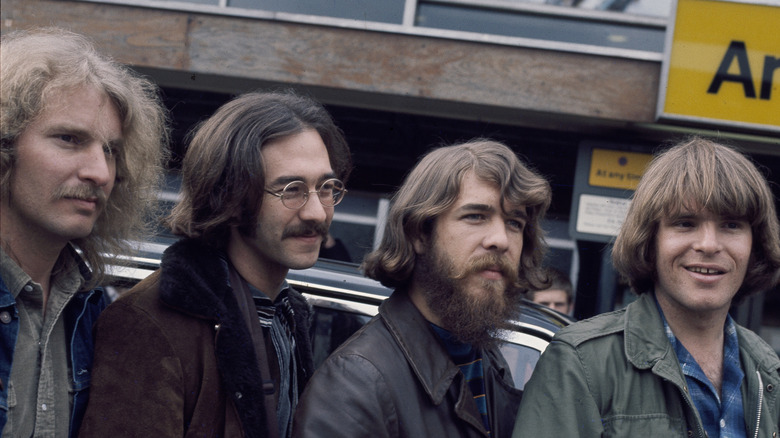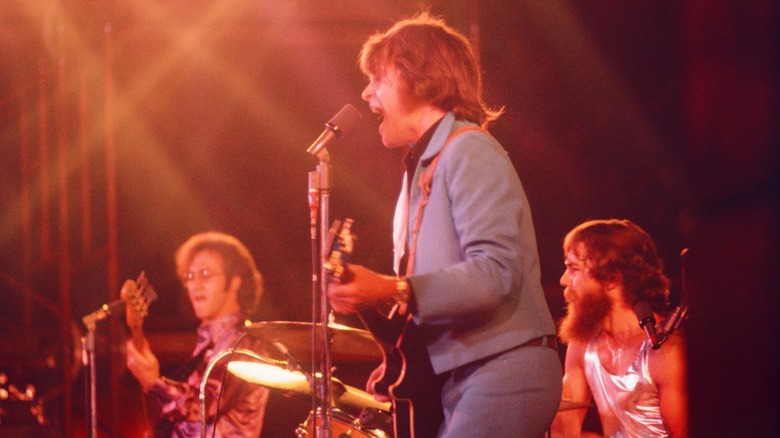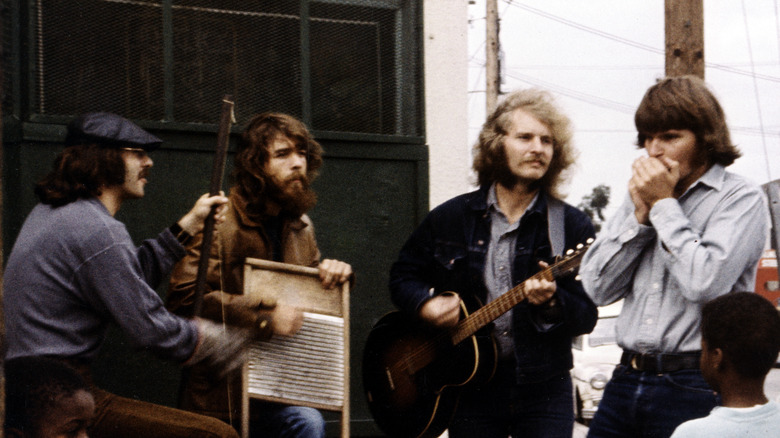True Stories Behind These Popular CCR Songs
Coming in hotter than a summer day on the bayou, root rockers Creedence Clearwater Revival (CCR) dominated the music charts in the late 1960s and early 1970s, with their distinct blend of rock, soul, and blues. Consisting of guitarist, songwriter, and lead singer John Fogerty, bassist Stu Cook, guitarist Tom Fogerty, and drummer Doug Clifford (via All Music), CCR had an impressive nine songs fall within the top 10 hits of Billboard's Hot 100 chart between 1969 and 1971. The group was officially disbanded in 1972 (via Ultimate Classic Rock), but they made an impact during the short time they were together — so much so that they were inducted into the Rock and Roll Hall of Fame in 1993. Their music lives on loud and proud today.
The best way to describe CCR's music? Think of it as the captivating soundtrack to the Southern bayou, luring fans in from the beginning, and taking them on a swamp rock-fueled ride with each album. Tunes like "Down on the Corner" and "Lookin' Out My Back Door" provided a fun and soulful tune to tap your foot to, while songs like "Fortunate Son" and "Run Through the Jungle" were written in response to the tumultuous events that defined the 1960s. Every song has a story, and these are the true stories behind some of CCR's most iconic songs.
Fortunate Son
If you've ever watched a movie that depicts the Vietnam War era, there's a decent chance you've heard "Fortunate Son" play in the background (such as in the Vietnam introduction scene in "Forrest Gump"). Sure, it may get some flack for being overplayed in Vietnam War-era films, but it's one of Creedence Clearwater Revival's most iconic songs — and its creation is both personal and political for John Fogerty.
According to USA Today, Fogerty wrote 1969's "Fortunate Son" in response to the wealthy dodging the Vietnam War draft — which Fogerty himself was drawn into service by. As USA Today reports, Fogerty was frustrated by how rich young men could use their privilege to get out of serving, as evidenced by the song's chorus, "It ain't me, it ain't me/ I ain't no senator's son, son/ It ain't me, it ain't me/ I ain't no fortunate one, no."
In an interview on the "Ultimate Classic Rock Nights" radio show (via Ultimate Classic Rock), Fogerty said writing the song was intense but easy at the same time, since he felt so strongly about its subject. The song got some buzz in 2020 when, according to USA Today, Fogerty issued a cease and desist order to then-President Donald Trump, after learning he had played it at campaign events.
Have You Ever Seen the Rain?
Turns out, Creedence Clearwater Revival's (CCR) 1971 hit "Have You Ever Seen the Rain?" isn't just a song about incoming gnarly weather — well, not in a literal sense at least. In an interview with ABC Audio (via WDRV), John Fogerty admitted that there was some serious tension within CCR when he wrote the song, but from that tension came inspiration. According to Rolling Stone (via River Rising), Fogerty admitted that the tune is about the looming demise of the band. He elaborates that the imagery (rain coming down on a sunny day) reflected that something serious was happening, during a seemingly bright and successful time for CCR. The song's lyrics also allude to Fogerty knowing the breakup was coming: "Someone told me long ago/ There's a calm before the storm/ I know it's been coming for some time."
Despite a lack of meteorological credentials, Fogerty called the incoming storm pretty well. As Louder reports, his brother and band guitarist Tom Fogerty wound up leaving CCR in February 1971, and the group eventually disbanded in October 1972. There's never been an official CCR reunion, but in 1993, according to Rolling Stone, the group (minus Tom Fogerty, who died in 1990) did once reunite rather uncomfortably on stage, when they were inducted into the Rock and Roll Hall of Fame — proof that, sometimes, gnarly weather lasts for decades.
Up Around the Bend
"Up Around the Bend" is one of Creedence Clearwater Revival's (CCR) most upbeat songs, with an opening guitar riff that lifts the heart and puts a spring in your step. Turns out, that's what John Fogerty wanted people to feel when listening to it. According to Fogerty's autobiography "Fortunate Son: My Life, My Music," he came up with the song while riding his motorcycle. CCR was about to embark on their first European tour at the time, and Fogerty was itching to get some new music recorded. He took a motorcycle ride and found inspiration along the way. As he put it in his book, "I just remember riding along, and the title phrase came to me. Just the feeling of going. Movement."
According to WMGK, "Up Around the Bend" was meant to be a hopeful song in the midst of turbulent times. CCR bassist Stu Cook said it was almost like the opposite of their song "Run Through the Jungle," which has heavier lyrics (via WMGK).
Run Through the Jungle
"Fortunate Son" wasn't the only Creedence Clearwater Revival (CCR) song inspired by a significant contemporary social issue. According to "Fortunate Son: My Life, My Music," it's been speculated that "Run Through the Jungle" is about the Vietnam War, given lyrics like "Better run through the jungle/ Whoa, don't look back to see." Plus, CCR already had "Fortunate Son" under their belt, so fans knew they weren't afraid to address the war in their music. However, the song isn't about events in Vietnam — it's actually about gun control. John Fogerty writes that he had been thinking of the song since the Texas Tower shooting of 1966, the first time when, according to him, he was "confronted with the fact that a seemingly normal person can turn not only criminal but into an insane, raging thing that we can't even understand."
During his appearance on "The Big Interview" (via Rolling Stone), Fogerty said that there was a specific statistic that lent itself to a few of the song's lyrics. A couple of lines in the song say, "Two hundred million guns are loaded/Satan cries, 'Take aim'." The statistic that inspired those lyrics, according to Fogerty, was that at the time, there was one gun for every single person — of any age — in the United States.
Proud Mary
"Proud Mary" is one of Creedence Clearwater Revival's (CCR) most successful songs, reaching the impressive number two slot on the Billboard Hot 100 chart in 1969. The tune beautifully combines swamp rock with soul, with a magnetic chorus that's hard to resist singing along to. How did such a classic come to be? As it turns out, this quintessential CCR song had humble beginnings in John Fogerty's songbook.
According to "Fortunate Son: My Life, My Music," Fogerty wanted to focus on songwriting after getting out of military service, so he bought a notebook where he could write down phrases he came up with: "Proud Mary" was the first phrase he wrote down. Fogerty goes on to explain that, while he liked the phrase for a song title, he had no idea what it would actually be about. Inspiration came a-knocking, though, once he got his discharge papers. He started playing his guitar and singing, and soon realized that "Proud Mary" was about a river boat (hence lyrics like "Rollin', rollin', rollin' on the river").
CCR wasn't the only music act to make it big with "Proud Mary." As The Atlantic reports, the "Queen of Rock" Tina Turner covered the song in 1971, while she was still part of Ike and Tina Turner. Turner's fierce cover took the duo's career to the next level — and seriously impressed Fogerty, who thought Turner's version was lovely.
Down on the Corner
1969 was definitely a good year for Creedence Clearwater Revival (CCR) tunes. One of their most popular songs, "Down on the Corner," peaked at number three on the Billboard Hot 100 chart that year, flooding the air waves with the story of Willy and the Poor Boys. But who exactly were Willy and the Poor Boys? The fictional band that rocked out on the washboard and kazoo was a product of John Fogerty's imagination.
In "Fortunate Son: My Life, My Music," Fogerty explains that he saw an ad for a "Winnie-the-Pooh Super-Pooh" package, which inspired him to come up with a fun, cartoon-like fictional group called Willy and the Poor Boys. Fogerty also says that each member of the fictional band is loosely based on the members of CCR. Willy and the Poor Boys became the album title for CCR's 1969 studio album, and inspired the lyrics for "Down on the Corner" (specifically, "Willy and the Poor Boys are playin'/ Bring a nickel, tap your feet"). Another fun fact about the song is that, in an interview on the "Ultimate Classic Rock Nights" radio show (via Ultimate Classic Rock), Fogerty said it was written the week leading up to the band's Woodstock performance.
Bad Moon Rising
"I see the bad moon arising" ... these are the catchy opening lyrics to Creedence Clearwater Revival's (CCR) 1969 song "Bad Moon Rising," which peaked at number two on the Billboard Hot 100 chart that year. The song's lyrics are filled with references to nasty weather ahead, but John Fogerty wasn't inspired to write this song after binge-watching the weather forecast. In fact, according to "Fortunate Son: My Life, My Music," Fogerty drew inspiration from a 1941 movie called "The Devil and Daniel Webster." Fogerty explains that certain elements of the film, including a scene featuring a nasty storm, helped him come up with the song's lyrics.
As Louder reports, the song wasn't just a natural disaster song, it was also a metaphor for the turbulence of the 1960s. Given everything that was happening, from Martin Luther King Jr.'s assassination, to the war in Vietnam, it's pretty easy to understand why Fogerty thought there was a bad moon constantly on the rise that decade. Despite the song's ominous muses, it became extremely popular for CCR — so much so that the song is still played more than five decades after its release. As Louder points out, the song's meaning can transcend generations and be considered ageless, so long as society faces turbulence.
Born on the Bayou
When you look at the lyrics to CCR's "Born on the Bayou," you get the story of someone reminiscing about their childhood on the bayou in the South. Given the vivid imagery, you'd think John Fogerty grew up in a hot and sticky Southern swamp ... but that's actually not the case.
According to All Music, Fogerty was born and raised in California, several states away from New Orleans, the Louisiana city mentioned in "Born on the Bayou." Sure, Fogerty was from the "Golden State" — but that didn't mean he couldn't romanticize a childhood in America's South. According to a Facebook post on Fogerty's official page, "Born on the Bayou" is about a fabled childhood in a swampy wetland. In "Fortunate Son: My Life, My Music," he elaborates that he felt a connection to the bayou even though he had never lived there. He felt such a powerful connection to it that he wrote "Born on the Bayou" without a guitar in hand — he could play it easily in his head.
Lookin' Out My Back Door
"Looking' Out My Back Door" is another one of Creedence Clearwater Revival's most popular songs, reaching number two on the Billboard Hot 100 chart in 1970. It's one of CCR's more whimsical songs, blending CCR's signature Southern rock sound with fairytale-like lyrics such as, "There's a giant doing cartwheels, a statue wearing high heels/ Look at all the happy creatures dancing on the lawn." So what exactly led one of the biggest rock bands of the time to record such a playful song?
Given the song's amusing choice of words and quirky imagery, some thought it was about drugs (via American Songwriter). However, John Fogerty set the record straight and revealed its wholesome inspiration. According to "Fortunate Son: My Life, My Music," Fogerty wrote it for his son, Josh, who was just a young kid at the time, which explains the lyrics about dinosaurs, elephants, and flying spoons. Fogerty also says he drew some inspiration for the song from a children's literature legend: Dr. Seuss — specifically, his book "And to Think That I Saw It on Mulberry Street."
Green River
John Fogerty seemed to get inspiration for a few Creedence Clearwater Revival (CCR) songs from unlikely sources. One of those said sources? A soda label – seriously.
"Green River" is another CCR song that hit number two on the Billboard Hot 100 chart in 1969. The lyrics talk about heading down to a river with cool water and plenty of catfish biting — a place that might feel homey and familiar to listeners. A trip to the river didn't inspire this song's title, though. According to "Fortunate Son: My Life, My Music," Fogerty got the title from a soda label at the tender age of eight years old. He longed to go to a river pictured on the label, and he stored that title away for years because he thought it might be important down the line.
That tasty fizzy drink wasn't the only thing that inspired "Green River" though. In an interview with Rolling Stone, Fogerty said the Green River wasn't based on any Southern waterway. He actually had Putah Creek, near Winters, California, in mind when writing it — a nod to his childhood in the Golden State.
Who'll Stop the Rain
"Who'll Stop the Rain" is a Creedence Clearwater Revival (CCR) song that appears on their 1970 album "Cosmo's Factory," and sounds simply like they're, well, asking who's going to stop the rain from coming down. Yet being a CCR song, the lyrics shriek of metaphor, but for what?
Forbes asked CCR drummer Doug Clifford if the song was written about Woodstock — a common myth given the concert's famously wet weather, but Clifford said it was originally written about Richard Nixon's presidency. Fogerty elaborates on this in "Fortunate Son: My Life, My Music," explaining, "That's really kind of a protest song, but I imagine not a lot of people look at it that way." Fogerty goes on to write that listeners don't have to completely understand the song's meaning to enjoy it, though. Clifford even said that people can decide for themselves if the song is about Woodstock or Nixon, and enjoy it all the same.
Long as I Can See the Light
Creedence Clearwater Revival's (CCR) song "Long as I Can See the Light" is one of their slower, more soulful songs, that really shows off John Fogerty's vocal chops. However, Fogerty didn't see the appeal of the tender tune at first. In "Fortunate Son: My Life, My Music," he writes that the song is about him feeling like a loner and needing a light to guide him back to where he belongs. He also admits that he didn't realize how wonderful the song was, and didn't perform it for years. That's changed, though, with Fogerty writing, "Now I do it all the time, and it resonates."
"Long as I Can See the Light" got some buzz on Father's Day 2020 when, according to WMGK, CCR released a new music video for the song, featuring photos and videos of CCR fans and their father figures — the guiding lights in their lives. The video also coincided with the upcoming 50th anniversary of "Cosmo's Factory," which "Long as I Can See the Light" is on, expressing the sentimental side of rock and roll.
